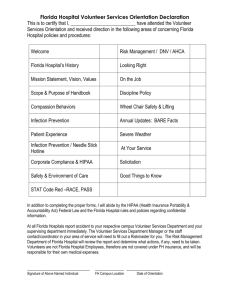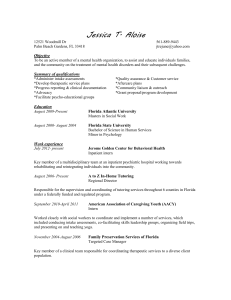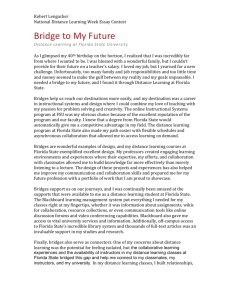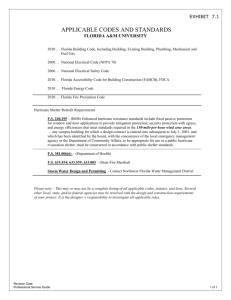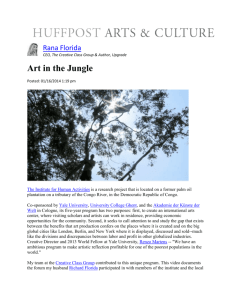Online Learning, Virtual/Blended Education, and Moving to Digital
advertisement
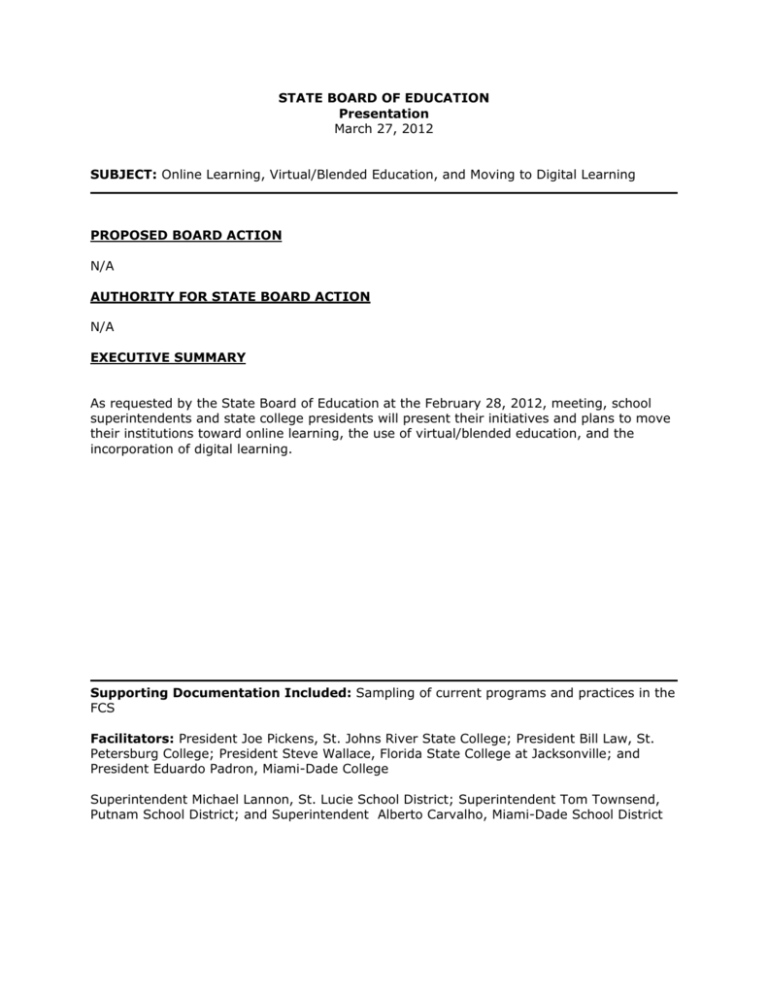
STATE BOARD OF EDUCATION Presentation March 27, 2012 SUBJECT: Online Learning, Virtual/Blended Education, and Moving to Digital Learning PROPOSED BOARD ACTION N/A AUTHORITY FOR STATE BOARD ACTION N/A EXECUTIVE SUMMARY As requested by the State Board of Education at the February 28, 2012, meeting, school superintendents and state college presidents will present their initiatives and plans to move their institutions toward online learning, the use of virtual/blended education, and the incorporation of digital learning. Supporting Documentation Included: Sampling of current programs and practices in the FCS Facilitators: President Joe Pickens, St. Johns River State College; President Bill Law, St. Petersburg College; President Steve Wallace, Florida State College at Jacksonville; and President Eduardo Padron, Miami-Dade College Superintendent Michael Lannon, St. Lucie School District; Superintendent Tom Townsend, Putnam School District; and Superintendent Alberto Carvalho, Miami-Dade School District BACKGROUND --PROVIDED BY THE FLORIDA COLLEGE SYSTEM The following information is provided as background on the current status of efforts in the Florida College System, and will not be covered verbally unless requested by a member of the State Board of Education. In addition, we have included a current sample of selected distance learning programs and practices in the FCS. E-Learning in the Florida College System: • While the term e-learning involves a variety of technological delivery methods including live broadcast, audio and videotape, materials or correspondence, computers and the Internet, the use of the Internet has emerged as the dominant form of instructional delivery. Currently, web-based or Internet delivered instruction accounts for 98% of all e-learning courses offered by Florida’s colleges. • During the last 15 years e-learning courses offered by the Florida College System have grown from 1,410 to 24,605 - a 1,745% increase. • During the last 15 years unduplicated enrollments in e-learning courses have grown from 16,633 to 268,374 unique students – an increase of 1,614% increase. In 2010-11 this instructional activity involved approximately 33% of all students enrolled in the Florida College System. • In the last five years alone e-learning course offerings have increased by 74% and unduplicated enrollments have increased by over 89%. • Increasingly, colleges are offering hybrid courses that take advantage of e-learning technologies to reduce the number of face to face class meetings, in favor of Intern technology-supported instructional delivery. These types of courses, along with e-learning courses, have combined to reduce the pressure for additional physical facilities. • E-learning courses are in high demand by students! E-learning courses fill up fast and first, with students often finding the flexibility provides them additional opportunities to work or take care of other personal obligations and challenges, while still pursuing a degree. • E–learning students use multiple delivery methodologies to meet their educational needs. Although the percentage can vary from college to college by 30 to over 80%, Florida College System e-learning students are normally also taking courses on a physical campus as well. • Students enrolled at a majority of the 28 colleges can now complete the entire AA degree online. • The Florida College System currently lists 159 programs (certificate through bachelors degrees) that can be completed through e-learning opportunities available in the Florida Higher Education Distance Learning Catalog. Web-Based Student Support Services: • As e-learning activities have grown, so too has the use of online services and digital content. Three important web-based services that support the growth of e-learning in the college system are the College Center for Library Resources, the Orange Grove Repository and the Online Admissions and Registration Initiative. • The College Center for Library Automation provides the automated library management system for all 28 colleges, support and training for staff, as well as the state-level, web-based searchable catalog of books, journals and digital content for students. During the 2010-11 academic year, CCLA provided access to students, performing 5.7 million library searches and over 13 million electronic resource searches. • The Orange Grove Repository is Florida's instructional digital repository for administrative, professional development, and educational resources. The repository currently houses over 2,000 individual learning objects, 5,148 open textbook resources (including 268 complete books) and another 69,289 instructional resources from connected repositories in other states or countries. • The repository provides an environment for educators to search for, use, remix, share, and contribute high quality educational resources and open textbooks. Institutions can achieve significant savings in developing online courses and programs by utilizing some of the many freely available resources. In addition, by selecting or adapting one of the many open access textbooks available in the repository, faculty can help students further avoid the high costs of some commercial textbooks. The University Press has developed Orange Grove Text Plus, allowing Orange Grove users to print textbooks on demand. • The 2011 Legislature directed the implementation of an online registration process, as outlined in two previous legislative studies. The Florida Distance Learning Consortium, working with FACTS and a workgroup composed of college and university representatives, developed and implemented the first phase of that system in November 2011. The system allows a student to search for an elearning course in the Florida Higher Education Distance Learning Catalog and click a link to begin a streamlined, automated process for admission and registration. Phase 2 of the initiative, including the processing of financial aid requests for students using the system, is currently under development. Future Developments: • The 2012 legislature established the Florida Virtual Campus which includes the consolidation of the Florida Distance Learning Consortium (FDLC), FACTS, the College Center for Library Automation (CCLA), and the Florida Center for Library Automation (FCLA). • The Florida Virtual Campus will provide a consolidated suite of student support and institutional support services in the areas of e-learning, advising, digital content, and library materials and operations, in a more collaborative and systemic, efficient manner. This increased collaborative umbrella will further enable our colleges to continue growth in e-learning and the ability to provide increased access and degree completion opportunities for students. • A major focus of the Florida Virtual Campus will the development of an Internet portal that provides a single point of access to online student and library support services and that can serve as the statewide resource and clearinghouse for public postsecondary distance learning courses and degree programs. Selected Distance Learning Practices in the Florida College System The Florida College System offers high-quality and flexible distance learning by: • Ensuring the instructional quality of online courses • Hiring instructional designers to assist full-time and adjunct faculty with online course development • Establishing faculty incentives for well-developed online courses • Offering fully online degree program and hybrid options • Delivering training opportunities for faculty and students Broward College Online and Blended Course Delivery: Broward College was an early adopter of the Quality Matters process to certify the quality of blended and online courses. Additionally, the College funds up to nine faculty annually for review and admission to Quality Matters Nationally Recognized Courses. This has provided peer, state, and national recognition for Broward College faculty for their exemplary online offerings. This has also helped to raise the bar for best practices in online and blended learning among the College’s growing distance learning catalog. Faculty Professional Development: The “Faculty Technology Mentor Project for Student Engagement” is a decade old program that has succeeded in pairing faculty technology “newbie’s” with a tech savvy peer. The focus of the program is to grow and encourage the successful utilization of technology to improve student learning outcomes and success. A best practice within the program is for faculty completing a technology project do so by using a framework built on the Community College Survey of Student Engagement (CCSSE) benchmarks. Thus projects are not only aligned with learning outcomes, but also address key aspects of student engagement. Professional development opportunities have broadened over recent years to include the diverse selection of Web 2.0 and cloud computing technologies that have shown promise for engaging students and raising success. Examples of this include the academic integration of social media, such as Facebook and Twitter, and a multitude of Web-based applications for content development via podcasting, vodcasting, polling, etc. A best practice for professional development has been to model successful completion through projectbased learning, centered on learning outcomes. This ensures that trainees demonstrate competency, and that attendance alone is not sufficient for successful completion. Another best practice that supports faculty use of technology, both online and on-campus, has been the use of “Faculty Associates.” Each associate has an area of expertise aligned with the College’s professional development program, so that faculty can get expert assistance far beyond the workshop experience. Faculty Associates provide direct support for ancillary technologies including Turnitin, Smartboards, Student Response Systems, tablet technology, etc. Online Education: In late 2011 the organizational unit charged with the delivery of online and blended courses adopted the Sloan Consortium’s newly minted “Quality Scorecard for the Administration of Online Education Programs.” This instrument is currently being at used at the College to develop best practices in the delivery of online education, and to identify where there are weaknesses that need correction. Page 1 of 9 Another best practice for faculty delivering blended and online courses, is the use of an online orientation to engage students early in the course, and to also allow strict adherence to attendance policies based on expectations of student participation. The “e-Learning Associate” program at Broward College has been a best practice for both online and campus-based use of the learning management system. The program provides over 20 faculty, all experts in distance education, who are available to work one-to-one in support of their peers. A best practice at Broward College has been the provision of a dedicated 24-hour help desk for all students and faculty using the learning management system. In place for eight years, this has been crucial for ensuring that all users can access technological support regardless of location or time. Gulf Coast State College Gulf Coast State College’s online enrollment has grown over 140% in the last three years, now accommodating over 12,000 online “seats” per year. GCSC implements two unique compensation models to encourage faculty and adjuncts to create and deliver highly engaging online courses. The college pays faculty and adjuncts to develop online courses based upon a design rubric which recognizes the complexity of individual course design and compensates accordingly (five varying levels of course development). The college also compensates online course delivery based on “levels of engagement,” wherein instructors are paid across “Five Levels of Course Engagement,” with classes capped at smaller enrollments for higher levels of engagement. Instructors are further compensated for each individual enrolled in online classes above the cap at that specific level of engagement. The rubrics for online course design and online course delivery were both developed in concert with faculty council and received their full approval and support. Together, these unique design and delivery strategies have helped to accelerate our online offerings and programs. (Rubrics for e-course design and e-course delivery compensation are available upon request.) Indian River State College Exemplary Programs: Indian River State College is committed to utilizing distance learning to expand access to higher education, reduce time to degree and increase completion of degrees, and certificates. The following online programs exemplify this philosophy: The Associate Degree Nursing (ADN) was developed as a response to the statewide nursing shortage. All didactic courses are online and a number of innovative practices have been implemented to ensure student success. These include the use of technologies such as class capture (Echo 360) which automatically make available to the online students the traditional face to face lecture within 2 hours of the class taking place. Students can then effectively have the best of both worlds with being able to clarify concepts or other course material that they are having difficulty understanding in the online class. Further the program gives students the ability to move freely between the online courses and the corresponding face to face courses. Further the use of social media and virtual worlds has created a sense of community among faculty and students resulting in removing feelings of isolation of quoted in the literature by distance learning students. To date 100% of the online students have succeeded in passing the required state licensure and 100% of gained employment as registered nurses. The Associate of Science Degree in Health information Management (HIM) is a fully online cohort program. HIM professionals are responsible for acquiring, analyzing, and protecting digital and traditional medical information vital to providing quality patient care. Students who have completed the Page 2 of 9 online program have a 100% percent pass rate on the national credentialing exam and a 90% find employment within 6 months of graduating from the program. Further feedback from all employers indicates a high degree of satisfaction with program graduates. This program has been innovative in developing a variety of learning activities to address various learning styles which include recorded online lectures, learning labs, and a virtual lab that teaches the software applications used in the industry. Many students indicate that this program is the only way that they could continue their education while juggling work and family responsibilities. The Bachelor of Applied Science Degree in Organizational Management is a fully online program. The availability of the program has allowed many adult learners to continue their education and also has accelerated the time to degree for many of the more traditional students. Currently over 53% of the total program enrollment is online. Students in the online courses have a success rate of 93% and in only three years of offering the B.A.S. in Organizational Management the graduation rate is already 58% with a total of 168 graduates. Clearly the online offerings have positively impacted the time to degree for students. Quality Matters: Indian River State College is a subscribing institutional member of Quality Matters. Quality Matters now a national standard for design practices of postsecondary online courses is a faculty driven peer review process. The Quality Matters instructional design rubric is built upon empirical evidence from the research on what constitutes best practice in online course design. The programs described above reflect this with each course in the programs having gone through a rigorous faculty driven peer review Quality Matters process before being offered online. Indian River State College is committed to this quality assurance design methodology. Master Courses: In order to maximize institutional resources and expand online course and program offerings Indian River is developing master courses using the Quality Matters instructional design rubric. The College conducted an analysis and found that over 52% of total institutional enrollment can be found in 28 courses. These courses are the typical general education courses and these are considered vital to the success of the Complete College Agenda goals for Indian River. Developing these courses using the Quality Matters design rubric produces model courses while simultaneously reducing costs through eliminating duplication and redundancy often found in typical decentralized development initiatives. The courses will provide increased access to higher education and will facilitate both two year and four year degree completion. The courses will also ensure equity across the system as the master courses will be available to all full time and adjunct faculty to use. This is considered a strategic best practice. Lake-Sumter Community College Lake-Sumter Community College has a Substantive Change application pending with the Southern Association of Colleges and Schools Commission on Colleges (SACS-COC) for approval to offer fully on-line degrees in several distance learning programs. The college community prides itself in delivering a high quality, affordable education to students with a variety of needs. One of the reasons we did not move to fully on-line degrees earlier is the challenge to the faculty and staff of how to continue to provide the customized personal student support services the college is known for on its campuses to those students attending fully online. To meet this challenge the college instituted virtual web conferencing powered by Blackboard Collaborate, a state of the art application that can be used both inside and outside of the Blackboard Learning Management System also used by the college. Collaborate provides for both audio and video communication over the Internet in addition to FERPA compliant secure document transfer capability. Page 3 of 9 Lake-Sumter instituted an in-house training program to bring the services of the Library, Learning Center and Advising to the fully online students using Collaborate to help meet the College goal of providing comparable services to the online students while increasing completion and retention for all students. As the first phase of the project nears completion, approximately fifty faculty and staff have been trained and have access to Collaborate virtual offices and classrooms. The College hopes to include additional services in the next phase of implementation. Candidates include Student Government, Financial Aid and Career Development. The project has been enthusiastically supported on all levels with numerous requests from all areas of the college to participate. The College is very proud of the progress made with this essential project and is looking forward to its continued success. Miami Dade College In the Virtual College at Miami Dade College, all online courses use a Master Course that is development by a team consisting of a SACS qualified faculty who teaches the online course at least once a year and an Instructional Designer. Graphics and technical support are available to the team. Faculty teaching online courses provide feedback for improvement to faculty developer of the master course. Master courses are revised at least every third year. Prior to developing a master course, faculty complete a 30-hour training course in online course development. Many faculty developers also complete training in the national recognized “Quality Matters” program that includes a rubric of quality standards for online courses. Content in online courses include rich media such as videos, discussions, group projects and interactive materials to increase student engagement. Several applications such as web conferencing, lecture capture software and plagiarism checker software is integrated with the Learning Management System (LMS). The majority of online courses are taught by MDC full time faculty thus providing the same quality teaching as face-to-face courses. Prior to teaching online, faculty must complete a “Virtual College Certification” course, which emphasizes best practices for online teaching. Prior to this certification, faculty complete training in using the learning management system. During the term, the Faculty Helpdesk provides technical support for the learning management system for all faculty teaching in the Virtual College. Faculty can call, email or visit to get assistance on any LMS issues. All online students have phone, email and online access to the Virtual College Student Helpdesk. The helpdesk supports students with registration, buying books, technical problems, taking tests, virtually any issue related to online courses. The helpdesk uses a software application that includes a ticketing system for tracking issues as well as a searchable knowledge base. Students in the Virtual College are provided student services online. These services include online advising as well as online tutoring. Any MDC student can register for online courses. A student may select from nearly 200 different courses and can complete their general education requirements, complete the AA program or complete several different AS programs completely online. Page 4 of 9 A no cost online orientation is available for students who are considering taking courses in the Virtual College. In addition to training on using the features of the LMS, the orientation includes an assessment of learning styles and techniques for each learner to be successful in the online classroom. The Virtual College Director of Student Services moderates the orientation. Establishing a sense of community for online learners has been shown to increase student retention. The Virtual College actively uses of social networking applications such as Facebook and Twitter to establish community. Students also receive frequent email communications from the Virtual College. Recently a mobile application with testing centers locations and directions was launched. North Florida Community College Hybrid Fridays: Due to the large geographic region that NFCC serves, many of our students face challenges regarding transportation to campus for classes. Certainly online classes are an option but for some students face to face interaction is important. Traditional face to face classes either require multiple trips to campus or a very long class period. To provide students an opportunity to reduce trips to campus as well as benefit from face to face classroom interaction, we are now offering a mix of general education and elective courses in hybrid/blended format that meet only on Friday. NFCC students are now able to enroll in 12 credit hours of classes on Hybrid Fridays with only one trip to campus. This not only offers convenience, but the potential for significant savings on travel and child care costs. Palm Beach State College • Developed a standard “look and feel” for all online courses. • Developed and implemented a quality assessment rubric for all online courses; each item on the rubric must be satisfied in the course design and approved by the eLearning office. • Provide instructional designer staff to help develop effective instruction in courses that ensures learning. • Ensure all courses have assessment and interactive course elements to increase student engagement such as course discussions. • Communicate to students on a regular basis through a Student Success Specialist focused on increasing course participation and success. • Require that courses are rich in content with faculty expertise, not canned courses from textbook publishers. Pasco-Hernando Community College Since 2005, Pasco-Hernando Community College’s (PHCC) Educator Preparation Institute (EPI) has provided an alternate route to teacher certification for mid-career professionals and college graduates who do not have a degree in education. PHCC’s EPI program is totally on-line, plus there is a hybrid option. Students with a baccalaureate degree from a regionally-accredited college or university may enter the EPI program to prepare to take the Professional Educator, Florida Teacher Certification Exam (FTCE). Prior to being granted a Florida Teacher Certificate, students must also demonstrate general knowledge and subject area competence through additional FTCE testing (these are not covered by the EPI program). The curriculum of the EPI program is focused on the standards of the Florida Educator Accomplished Practices (FEAPs). The courses are comprised of segments that provide students with Page 5 of 9 the skills set and knowledge base necessary for those in the teaching profession. Students are also required to create a portfolio that documents their competency of the FEAPs and students must also pass all required sections of the Florida Teacher Certification Exam. From 2005 to 2011, 100% of the program’s completers have passed the Professional Education portion of the FTCE (Annual Program Evaluation Plan for Educator Preparation Institute, PHCC 2010-2011). The EPI program consists of seven courses and two field experiences (diversity and professional foundations) for a total of 21 credit hours of instruction. Each course is from three to six weeks in length and is presented either in a classroom setting and/or online venue. The online model can be completed in approximately seven months, depending upon semester breaks. The classroom model is only offered at the New Port Richey campus and takes ten months to complete - August through June. The Educator Preparation Institute provides a resourceful way for the state to vigorously recruit and train teachers. Recent data collected by the Florida Department of Education finds that students who complete EPI programs enter classrooms in Florida, teaching a variety of levels and disciplines, including those critical need areas such as math, science and reading. Teachers who were prepared through EPI programs have consistently evaluated their preparatory experiences as being very effective in preparing them for the classroom. Currently, there are approximately 200 students in various phases of the program. Polk State College Comprehensive Mentor Program: New full- and part-time faculty participate in a comprehensive mentor program. Mentors orient new faculty to college policies and procedures as well as effective teaching strategies. New faculty teaching in the hybrid and online formats are added as invisible instructors to online courses taught by experienced faculty. This allows them to observe strategies for designing online courses and interacting with students. Distance Learning Mentor Program: Polk State College has also instituted a distance learning mentor program. Faculty using the learning management system to teach online, hybrid, or to supplement a face-to-face course are assigned a mentor to help them learn the technology tools. Faculty can request a mentor to assist them with other technology-related topics and tools such as the use of video cameras, Smart Boards, or Sympodiums. Online Degree Program: The Computer Network Engineering Technology program is currently engaged in a pilot to create a fully online degree program. This will include all general education and required core courses. The courses will be submitted to Quality Matters in order to create an entirely QM-reviewed program. One College Algebra course has already been approved by Quality Matters. At the conclusion of the pilot, the College will have a process that other programs can use to create fully online degrees. Online Dual Enrollment: The College is preparing to pilot online dual enrollment with both the Polk County School District and Florida Virtual School partners. Local high school face-to-face teachers will be paired with Polk State College faculty to deliver online courses and create innovative instructional models which facilitate student success. Polk State College will also serve as the provider for Florida Virtual School in a pilot program to extend online dual enrollment options throughout the state. Page 6 of 9 Separate pilots are being planned involving ENC 1101: College Composition I and SLS 1101: College Success. Santa Fe College A YouTube Sensation: Santa Fe Professor of Accounting Susan Crosson has gone viral! In order to create additional instructional resources for students enrolled in her online accounting classes, Crosson started posting short 2- to 5-minute videos on YouTube in October 2007 as a way to help students learn specific concepts in accounting. She now has over 200 videos up on the video website and has garnered approximately 2,000,000 hits since then. The postings cover basic concepts in financial and managerial accounting and are broken down by specific units that parallel the accounting textbook she uses in class. With so many hits, Crosson knows that her Santa Fe students are out there using the videos, but they have lots of diverse company. Many appear to be corporate managers trying to make sense of their financial statements, but she has also been contacted by students in Europe, India, Saudi Arabia, and elsewhere who are trying to learn accounting. The channel has followers around the world. Fostering Global Citizenship: Building on several faculty exchanges between Santa Fe College and Tullängsskolan, a technical college in Orebro, Sweden, students enrolled in Dr. Naima Brown’s sociology courses engage in weekly chats with peers in Sweden. Using Skype video for synchronous communications, Santa Fe students speak directly with students in Sweden about issues related to marriage and the family, social problems, social behavior, and other topics to gain an appreciation and awareness of cross-culture similarities and differences. Students in Sweden gain the same benefits and get to practice their English as well. The program has been so successful that students often continue their conversations through Facebook, and Santa Fe is launching a student study-abroad program that will allow students from Florida to visit Sweden. Communicative Skills in Foreign Languages: In response to demonstrated need from students seeking to satisfy a foreign language requirement online, faculty at Santa Fe College have created an online program in Spanish (Spanish 1, 2 and 3), that provides ready access to courses most frequently taught in traditional face-to-face mode, and that includes instruction and assessment in all the communicative language skills. In addition to demonstrating mastery in reading and writing skills, students studying Spanish online at Santa Fe are also required to communicate with their instructor using voice-over-internet (VOI) to practice speaking and listening skills. In this way, students studying a foreign language acquire the same skills and learning outcomes as students in a traditional setting and can move seamlessly between different instructional formats, or into upper-division classes. While Santa Fe College offers Spanish in three delivery modes (completely online, hybrid, and face-to-face), the success of the online delivery mode has provided such excellent student learning results that we have decided to offer only two modes, completely online and hybrid. Flexible Instruction in Biotechnology: In an effort to blend the flexibility of online instruction with real-world lab skills, Santa Fe’s Biotechnology programs offer a unique instructional delivery system which includes online delivery of the didactic portions of the curriculum and hands-on lab exercises that allow students to gain experience with critical lab techniques. This unique format allows the program to better utilize capital equipment and the lab environment, and it provides greater flexibility for student schedules and lab experiments that have longer or unusual incubation requirements. Virtual Labs in Health Sciences: To meet the demand for gateway courses in health sciences, Santa Fe College is offering both fully online and hybrid versions of all professional prerequisite classes required for health-related programs. In its online classes of Chemistry, Anatomy and Physiology, and Page 7 of 9 Microbiology, students use a variety of simulated animation and visualization programs to gain knowledge of lab skills. In the hybrid versions, students review didactic instructional materials online, come to campus once a week for group discussion, problem solving, and lab activities, and then complete the rest of the course online through assignments, discussion boards, and projects. St. Johns River State College SJR State is in many ways three small colleges with a drive of a full hour between each campus. Although many of our students do take courses on more than one of our campuses, due to work and other obligations, this is not a viable option for all students. Distance Learning is one of the tools we utilize to help bring programs and the expertise of instructors to students at all three of our campuses without the College completely duplicating services at each campus. SJR State currently offers 100% of the college credits required for the AA degree via distance learning. Many of the requirements of our AS degrees can also be completed fully via distance learning. Both our Bachelors Degree in Early Childhood Education and our Bachelors Degree in Organizational Management are designed for working adults and as such all coursework within both degrees is offered either as a hybrid or fully online, meaning students have reduced on campus seat time (or no seat time at all) in every course they take at the baccalaureate level. We strive for highly interactive online classes in both lower division and upper division courses that require students to interact not only with the subject matter but also with their instructor and their fellow classmates using a variety of tools including but not limited to threaded discussions, virtual office hours and chat rooms, and streaming audio and video. St. Petersburg College SPC Course Design and Development: Prior to designing a course, SPC faculty are required complete Pathways to eLearning Level III training, which addresses online tools and techniques and can serve as a working guide to the design of a course unit. (Levels I and II, which address tools in the learning management system platform, are required prior to teaching a course.) Course design and course review processes at SPC are closely aligned in an effort to insure that our courses continually improve over time. Developed at the start of the Project Eagle grants, SPC course quality standards follow the same basic principals as those used by Quality Matters. Instructional design technologists expanded the processes over time so that critical thinking techniques are incorporated, and the resulting courses accommodate a variety of learning styles and disabilities. Course design is initiated by the dean assigning the project to a faculty member following the approval of the course development (description, objectives, etc.). The faculty member plans the course using a course design blueprint template to determine the methods of instruction, interaction and assessment to be used for each course objective. Typically this step involves a meeting with the instruction design technologist to discuss the best ways to meet various objectives. Librarians and disability specialists may also be consulted in this step. The course design blueprint can also be used during the course review conducted every three years, to further refine and enhance the course. Once the course design planning is complete, the faculty member creates one unit of the course, submitting it for review to uncover and correct any issues with the course design early in the process. When the course is complete, the instructional design technologist uses a detailed checklist to review the course, submitting that feedback to the dean. A peer review follows to insure that the course meets the objectives as designed. The peer review checklists are also submitted to the dean, who does a Page 8 of 9 final review to confirm the integrity of the course prior to issuing approval for the course to be delivered. Page 9 of 9


